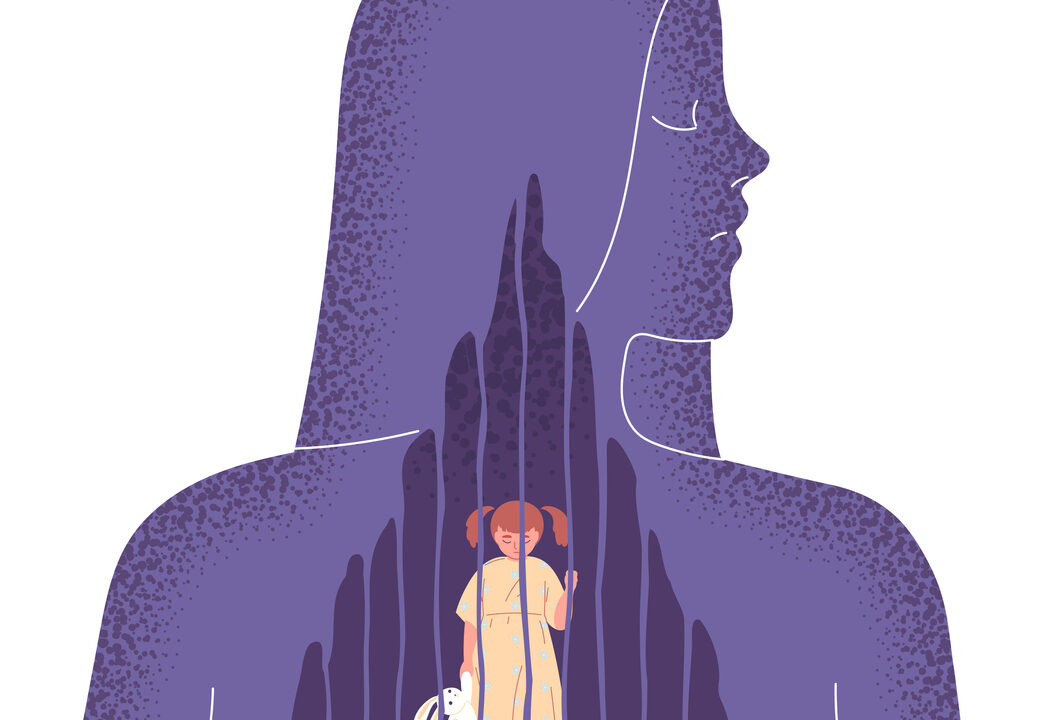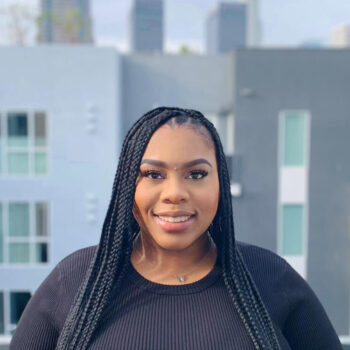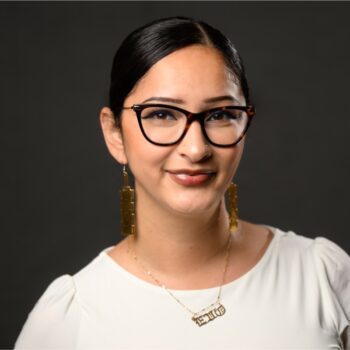For four weeks leading up to the Spring 2024 primary elections, Carla was a lead canvasser who knocked door after door, after door, asking Los Angeles residents one thing: do you support closing Men’s Central Jail—a notoriously inhumane and deadly jail—and not replacing it with another locked facility? Carla’s son is overcharged and currently incarcerated pre-trial at Men’s Central Jail on a bail she can’t afford to pay. She embodies what it means to be an advocate and caretaker for her son a thousand times over.
Carla is an unlikely canvasser. We typically find canvassers to be people who are less encumbered and not personally connected to the issues they are often being paid to canvass for. Because of the compounding implications and extent of their responsibilities as caretakers, it’s not as likely for canvassers to be women with incarcerated loved ones, like Carla. Her day job is to provide intensive around-the-clock care in exchange for housing, and in lieu of wages. She juggles multiple gigs to sustain herself so she can save up the money needed for her son’s attorney and legal fees. She commutes two hours on public transit across Los Angeles to ensure she never misses even one of her son’s court dates since his incarceration three years ago. She also never misses a canvassing shift.
This past fall, Carla returned to canvass for the general election, joined by new canvassers like Sadi, another mother with a son also incarcerated at Men’s Central Jail. Sadi is canvassing because Proposition 36 is on the California ballot. Prop. 36 is a $49 billion investment in incarceration and court costs over the next ten years that is predicted to send 150,000 more people to jails each year by mandating felony, rather than misdemeanor, charges for some non-violent drug and theft offenses. For women with incarcerated loved ones like Sadi, Prop. 36 is yet another alarming attempt at increasing the criminalization and incarceration of our communities.
“I’m canvassing to talk to voters about Prop. 36 and Men’s Central Jail which is important to me because my son is there,” Sadi said. “On the doors, I want people to really see that incarcerated people are still people. I want to humanize my son. I want to humanize our loved ones. I want people to see me, someone directly impacted by their votes on issues like Prop. 36 and closing Men’s Central Jail, and ask them, “What if this happened to you?” My son is incarcerated pretrial, he hasn’t been convicted of a crime, but I couldn’t afford his bail. I felt helpless and like I can’t do anything for him…but I can do this. I can canvass.”
Women with incarcerated loved ones are in a unique position of being victims of patriarchal violence and also of seeing deficiencies in the criminal legal system. They are uniquely able to identify policy that is likely to work or fail vulnerable populations. They aren’t canvassers who are simply knocking doors and saying to “vote progressive.” Women with incarcerated loved ones support care-centered, public safety strategies and are more likely to advocate for criminal justice reforms that make our communities stronger and safer. In partnership with California Black Power Network, and Dignity and Power in Action, Essie Justice Group is canvassing as part of its long-term base-building work, bringing women together in community and opening paths to power for women impacted by the criminal legal system.
Advocating from Experience
In the United States today, one woman in four has an incarcerated loved one. Women with incarcerated loved ones—wives, mothers, grandmothers, daughters, granddaughters, and sisters of loved ones in jails and prisons—are expert caretakers who are the unseen reentry system of this country. When someone comes home from jail or prison, it is almost always a woman who supports their reentering into society, from ensuring their loved ones have access to resources, healing, and care to facilitating family and community reintegration. Many women have the common experience of having an incarcerated loved one. What’s uncommon are their opportunities to speak directly about their experiences and be the progressive change advocates they have the potential to be.
Imani is a formerly incarcerated mother of five, survivor of domestic violence, and member at Essie Justice Group. She is canvassing because Prop. 36 would also remove over a billion dollars of funding from supportive community-based programs like: substance abuse treatment, homelessness prevention, and crime survivor services. Women with incarcerated loved ones like Imani know that less money invested in programs that have been proven to reduce crime and improve conditions in our communities guarantees our communities to be less safe.
”I can personally relate to needing access to affordable housing, healthcare, and supportive programs. I don’t want such harsh punishment like incarceration for petty crimes because people aren’t stealing just for fun—it’s out of survival. If we had access to more supportive resources and programs, affordable housing and healthcare, people wouldn’t have to stay in survival mode just to live,” Imani said.
Incarcerating people and releasing them in ways that are destabilized—without access to supportive reentry services, housing, or substance abuse and mental health treatment—are consequences of Prop. 36 that would then perpetuate cycles of homelessness and incarceration. In response, women with incarcerated loved ones are urging community members to also support propositions and measures like California’s Prop. 5 and Los Angeles County Measure A that aim to increase funding for affordable housing. Women with incarcerated loved ones know that access to affordable and permanent housing is a fundamental pillar for stability, wellbeing, and safe communities.
Lifting Barriers to Advocacy
Women with incarcerated loved ones are not only canvassing because of the issues, but because they are able to. Leading up to the March primaries, five women with incarcerated loved ones from our membership canvassed. “We had a theory that women with incarcerated loved ones—the very people who would be the most impactful canvassers on progressive issues—are the very people who cannot afford to doorknock. Whether because of juggling multiple jobs and economic pressure, or the extent of their caretaking responsibilities, we understood that this type of organizing work might be hard for our members,” explained Tejal Kothari, Director of Member Strategy & Impact at Essie Justice Group. “Our mission then became to reduce barriers so women with incarcerated loved ones could lead the way.”
Each of the canvassers we recruited had access to barrier reduction support like canvassing training, transportation, hot meals, and other individualized accommodations to make possible their participation and leadership. Now, in the weeks leading up to the November election, our canvassing team has increased by 500%, swelling to 30 women with incarcerated loved ones.
Once provided with access, support, and training, unlikely canvassers like women with incarcerated loved ones are effective. They have unique potential to create real change; 90% of the 800-plus voters we spoke to ahead of the March primaries agreed that the county must close Men’s Central Jail. After conversations with women with incarcerated loved ones, they saw Men’s Central Jail, with its long-standing history of abuse and scandal, as a direct violation of human rights. This perspective was in stark contrast to elected officials’ claims of public opinion and fear of crime as barriers to closing the jail. In fact, many community members, in the only district with a Republican representative, wondered why Los Angeles’s deadliest facility is still open.
Women with incarcerated loved ones have long been inviting our society to reimagine visions for public safety through investment in alternatives to incarceration rooted in care and healing. Society’s stigma on incarceration and the judgment and shame women experience from having a loved one behind bars often leaves them isolated and overlooked as a prevalent and mobilizable group equipped to create real, transformative change. As evidenced by the outcomes from our canvassing leading up to the March primaries, it’s clear just how effective unlikely canvassers like women with incarcerated loved ones are.
“I had relatability with the people I spoke to on the doors because I was coming from a place of authenticity. My experience was really an important talking point because it’s not like being a door-to-door salesman—I was speaking from the heart and from my direct experience. I was able to break barriers of shame and judgment for myself and for community members,” Carla reflected.
Turning the Tide Towards Care
The incoming political climate will be rife with strategically misleading narratives from the Right about criminal justice reform, crime, and public safety, communities that are isolated are breeding grounds for voters to be organized by the media, and disconnected from the power of their civic engagement. Women with incarcerated loved ones are expert isolation-breakers. Undertaking the political project that is breaking their isolation, and that of their neighbors, is the first step in creating politically active and organized communities.
If women with incarcerated loved ones were the canvassers across this country, we wouldn’t see efforts like Prop. 36 succeed. Instead, we’d see the implementation of efforts like Prop. 5, Measure A, and other viable alternatives to incarceration that have been proven to provide people with access to the support they actually need. We’d see our democratic process be made stronger, and our democracy made healthier. Regardless of the outcomes this election season, unlikely canvassers like women with incarcerated loved ones are committed to shifting society’s tide towards care, and will stay the course in becoming a formidable force to be reckoned with during election seasons.


